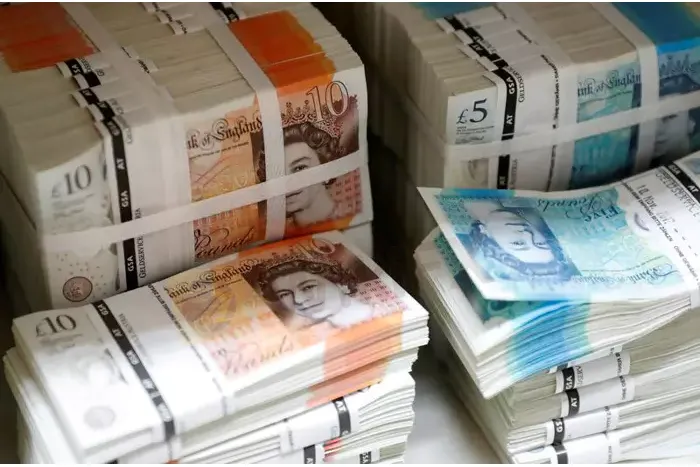简体中文
繁體中文
English
Pусский
日本語
ภาษาไทย
Tiếng Việt
Bahasa Indonesia
Español
हिन्दी
Filippiiniläinen
Français
Deutsch
Português
Türkçe
한국어
العربية
Britain’s cost of living crisis sends sterling to lowest since mid-July
Abstract:Sterling fell to its lowest since mid-July against the dollar on Monday as surging energy costs and a summer of strikes highlighted the UK cost of living crisis and intensified fears for further economic slowdown.

Amid worries around Britains surging inflation and declining economy, sterling recorded its biggest weekly fall against the U.S. dollar since September 2020 on Friday.
By 1105 GMT, it was down 0.3% at $1.1798 after briefly falling to $1.1785, its lowest level since July 14.
Against a weakening euro, sterling held at 84.82 pence, edging 0.1% higher on the day, after falling to a near four-week low against the single currency on Aug. 19.
“The weak UK growth outlook continues to weigh on the pound. News that Ofgem is set to announce on Friday that UK average annual household energy bills are likely to rise to more than 3,500 pounds ($4,128.60) reinforces the headwinds facing consumers,” said Jane Foley, head of FX strategy at Rabobank in London.
Britains cap on domestic energy prices is expected to rise to over 4,200 pounds a year in January, up 230% on the year before, due to soaring wholesale costs and changes in the way the cap is set, analysts said in August.
Strikes over pay at Felixstowe, the UKs largest container port, highlighted issues surrounding the cost of living crisis and threatens to worsen the supply chain issues for UK companies, Foley added.
Summer of strikes
Felixstowe staff became the latest workers to strike in Britain as unions demand higher wages for members.
The squeeze on household incomes has already led to strikes by the likes of rail and bus workers demanding higher pay rises.
Money markets are pricing in another 50 basis point rate rise from the Bank of England next month as the central bank seeks to smother surging inflation at 10.1% in July. [IRPR]
An economist at U.S. bank Citi said on Monday British consumer price inflation is set to peak at 18% – nine times the BoEs target – in early 2023. Benjamin Nabarro raised his forecast once again in the light of the latest jump in energy prices. Consumer price inflation was last above 18% in 1976.
In its August meeting, the BoE raised its benchmark interest rate to 1.75% from 1.25%, the sixth hike since late 2021 and the biggest in 27 years. It warned of a recession by the end of the year that could last until 2024.
Official data also showed Britain borrowed more than expected in July, underscoring the challenge facing the countrys next prime minister over how to provide more support to consumers.
The pound has weakened more than 3% in August against a strengthening dollar, which has been supported by safe-haven flows. The UK currency is one of the worst performers among G10 currencies this year.

Disclaimer:
The views in this article only represent the author's personal views, and do not constitute investment advice on this platform. This platform does not guarantee the accuracy, completeness and timeliness of the information in the article, and will not be liable for any loss caused by the use of or reliance on the information in the article.
Read more

The Daily Habits of a Profitable Trader
Every professional trader follows a structured approach to ensure they are well-prepared, disciplined, and able to seize opportunities with confidence. Whether you are a seasoned investor or an aspiring trader, adhering to a robust daily checklist can significantly enhance your performance. Use this checklist to check if you are a qualified trader

The Impact of Interest Rate Decisions on the Forex Market
Interest rate changes determine currency attractiveness, influencing capital flows and exchange rate trends. Understanding this mechanism helps investors navigate the forex market effectively.

How a Housewife Lost RM288,235 in a Facebook Investment Scam
A 47-year-old housewife in Malaysia recently fell victim to an online investment scam, losing a substantial sum of RM288,235 after engaging with a fraudulent scheme advertised on Facebook.

A Trader’s Worst Mistake: Overlooking Broker Reviews Could Cost You Everything
In today’s digital age, reviews influence nearly every decision we make. When purchasing a smartphone, television, or home appliance, we pore over customer feedback and expert opinions to ensure we’re making the right choice. So why is it that, when it comes to choosing an online broker where real money and financial security are at stake many traders neglect the crucial step of reading reviews?
WikiFX Broker
Latest News
The Withdrawal Trap: How Scam Brokers Lure Victims into Paying More
FCA to Investors: Think Twice Before Trusting These Brokers
Trump\s tariffs: How could they affect the UK and your money
Trump gambles it all on global tariffs he\s wanted for decades
TradingView Brings Live Market Charts to Telegram Users with New Mini App
Trump tariffs: How will India navigate a world on the brink of a trade war?
Interactive Brokers Launches Forecast Contracts in Canada for Market Predictions
Authorities Alert: MAS Impersonation Scam Hits Singapore
IG Group Acquires Freetrade for £160M to Expand UK Investment Market
U.S. March ISM Manufacturing PMI Released
Currency Calculator







